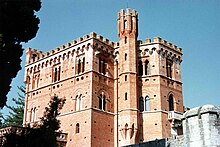Bettino Ricasoli
Baron Bettino Ricasoli (born March 9, 1809 in the Palazzo Ricasoli in Florence , † October 23, 1880 in Castello di Brolio, Gaiole in Chianti ) was an Italian statesman.
Life
Ricasoli came from an old Tuscan family. One ancestor was Fra ( Fratello 'brother') Giovanni Ricasolo, financier of Fort Ricasoli of the Order of Malta in Malta . Bettino received his school education in Florence and Prati, including at the Convitto Nazionale Statale Cicognini, and devoted his life to agricultural studies, from 1834 as a member of the Accademia dei Georgofili of Florence. At Castello di Brolio, his family's estate near Gaiole in Chianti , he ran a. a. Sericulture , agriculture and especially viticulture ( Chianti ).
In 1846 he sent the Grand Duke of Tuscany , Leopold II , who was considered open-minded towards liberal ideas, a memorandum with reform proposals and in 1847 founded the daily La Patria as the mouthpiece of the moderate democratic forces in Florence. On December 12, 1847 he was appointed Gonfaloniere of Florence . In the revolutionary years of 1848/49 he did not join the radical republicans, but participated in the moderate government that enabled the return of the Habsburg Leopold II, who had been expelled in the meantime . Ricasoli then withdrew into private life out of disappointment about his will to reform, which had meanwhile vanished, and the subsequent Austrian occupation of Florence.
Leopold II's refusal to follow Viktor Emanuel II's request to collect troops against Austria in the Second Italian War of Independence led to another uprising in 1859 and the final expulsion of Leopold II. Ricasoli joined the movement and founded the daily newspaper in the same year La Nazione , which still appears in Florence today. As Minister of the Interior of Tuscany, he also supported the unification of Tuscany with Piedmont and the further efforts of the Risorgimento to unite the Kingdom of Italy from 1859 .
On March 26, 1860 Ricasoli was appointed Governor General of Tuscany by Victor Emmanuel II, on April 6 as Director of the Ministry of the Interior and finally, after Cavour's death in June 1861, Prime Minister . He achieved the recognition of the young Italian Union by a number of European states and the incorporation of Garibaldi's freelance into the regular army, and as a devout Catholic he tried in vain for a reconciliation with the Vatican . His failure on this question, which was considered a prerequisite for the peaceful integration of Rome into the Italian Kingdom, led Ricasoli to resign in March 1862 in favor of the Rattazzi government .
In June 1866, with the beginning of the Third Italian War of Independence , Ricasoli again took over the leadership of the government. However, as before, it failed because of the question of reconciliation with the Vatican, this time because of the resistance of anti-clerical forces in parliament. In April 1867, he felt compelled to resign again.
Since then Ricasoli has not participated in public life and devoted himself again to viticulture at Brolio Castle. In 1872 his work achieved historical significance once again when he wrote down what he believed to be the ideal cuvée made from different grape varieties for a Chianti in a letter to Professor Cesare Studiati from the University of Pisa. This should become a binding model for several generations of Italian winemakers . His strict requirements also led to his honorary title Eisenerer Baron. Ricasoli died on October 23, 1880 at Brolio Castle, Gaiole in Chianti, Tuscany. His winery, which is now family-owned again, is considered the oldest winery in Italy.
Honors
Bettino Ricasoli's political work received numerous honors. His native city of Florence honored him with a monument, the city of Udine named a 9,000 m² city park the "Giardino Ricasoli Udine", and countless cities such as B. Florence, Livorno, Siena, Rome, Milan, Palermo or Grosseto named a street in "Via Ricasoli" as well as the municipality of Gaiole in Chianti. The Italian Navy named a torpedo boat after Bettino Ricasoli around 1926.
Coat of arms of the Ricasoli family at Palazzo Ricasoli
Coat of arms of the Ricasoli family
Vittorio Emanuele II , King of Italy
Urbano Rattazzi , his successor as Prime Minister
his place of death Castello Brolio near Gaiole in Chianti
Livorno , Via Ricasoli
literature
- Christian Satto: Bettino Ricasoli. Imprenditore agricolo e pioniere del Risorgimento vitivinicolo italiano. Aska Edizioni, Firenze 2010, ISBN 978-88-7542-158-8 . (Italian)
Web links
- Ricàsoli ‹-s-›, Bettino, barone in Enciclopedia on line at treccani.it (ital.)
| personal data | |
|---|---|
| SURNAME | Ricasoli, Bettino |
| ALTERNATIVE NAMES | Ricasoli, Bettino Baron |
| BRIEF DESCRIPTION | Italian statesman |
| DATE OF BIRTH | March 9, 1809 |
| PLACE OF BIRTH | Florence |
| DATE OF DEATH | October 23, 1880 |
| Place of death | Gaiole in Chianti |
















